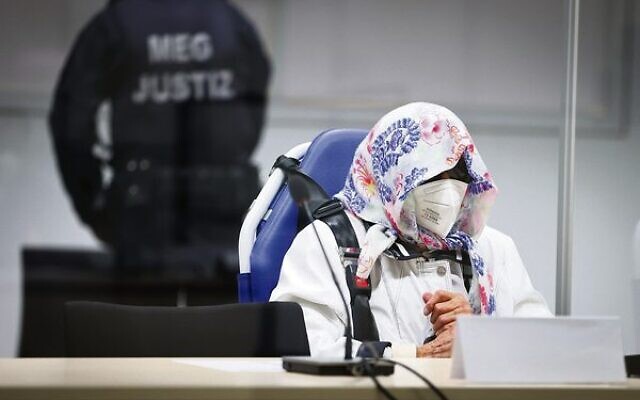Stutthof secretary on trial over 11,000 deaths
A 96-year-old former Nazi concentration camp secretary who absconded last month before her trial has appeared in court in Germany to face charges of aiding and abetting murder.
The first woman to be prosecuted for Nazi-era crimes in decades, Irmgard Furchner is charged with complicity in the killing of more than 11,000 people at Stutthof camp in Poland.
A bailiff brought the pensioner into the regional court in the northern town of Itzehoe seated in a wheelchair, with her head covered by a scarf and her face by a mask.
It was the second attempt to start proceedings against Furchner after she fled the retirement home where she lives on September 30, as her trial was set to begin, and headed to a metro station.
The defendant managed to evade police for several hours before being apprehended in the nearby city of Hamburg and temporarily held in custody by authorities.
Between June 1943 and April 1945, Furchner worked in the office of camp commander Paul Werner Hoppe. Prosecutors say she took dictation of the SS officer’s orders and handled his correspondence.
Roughly 65,000 people died at the Stutthof camp, among them “Jewish prisoners, Polish partisans and Soviet Russian prisoners of war,” according to the indictment read out by public prosecutor Maxi Wantzen.
A teenager at the time the alleged crimes were committed, Furchner is being tried in a juvenile court.
Wantzen said the defendant’s clerical work at Stutthof “assured the smooth running of the camp” and gave her “knowledge of all occurrences and events at Stutthof,” including mass killings.
The prosecutor said that the suffering of victims sent to the camp’s gas chambers including cries and jostling at the bolted doors were “clearly audible” to all at the camp.
Moreover, the “life-threatening conditions” with food and water shortages and the spread of deadly diseases including typhus were intentionally maintained and immediately apparent.
Her failure to present herself in September showed “contempt for the survivors and also for the rule of law,” the vice president of the International Auschwitz Committee Christoph Heubner told AFP at the time.
“Healthy enough to flee, healthy enough to go to jail!” tweeted Efraim Zuroff, chief Nazi-hunter of the Simon Wiesenthal Centre.
Around the same time Furchner fled her trial, a 100-year-old former Nazi concentration camp guard appeared before judges at a court in Neuruppin, northwest of Berlin.
Josef Schuetz, who stands accused of assisting in the murder of 3518 prisoners at the Sachsenhausen camp between 1942 and 1945, told the court he was “innocent” and “knows nothing” about what happened.


comments